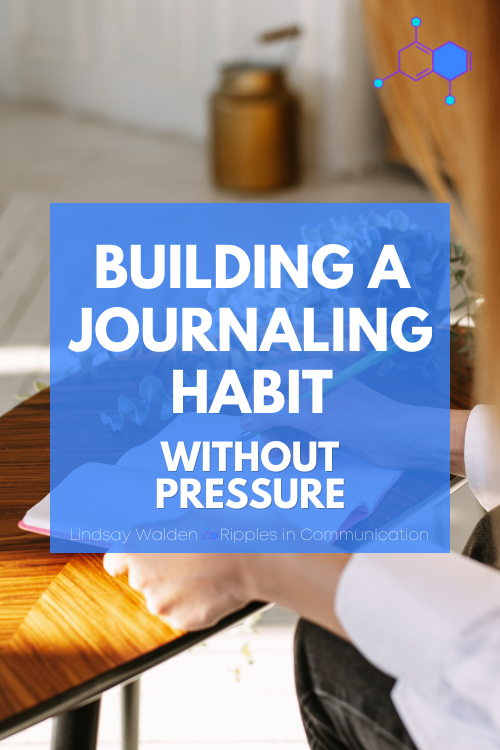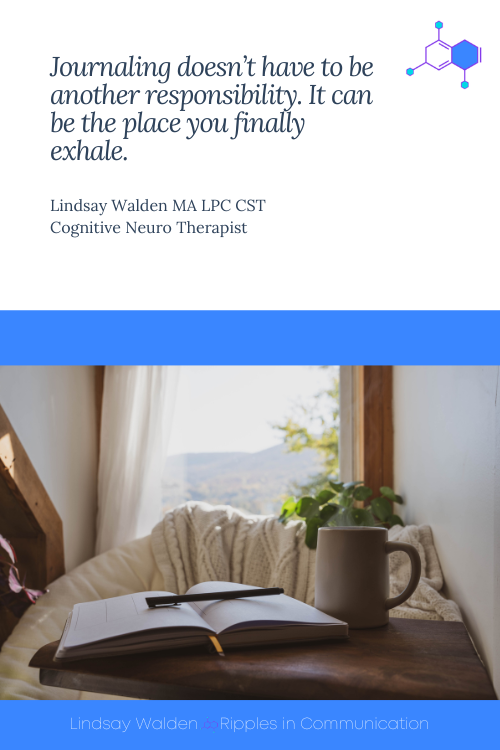What If Journaling Didn’t Have to Be Hard?
Have you ever sat down with the best intentions to journal—only to stop after a few days or weeks?
Maybe you bought a beautiful notebook, promised yourself you’d write every morning, and even felt excited about it at first. But before long, it felt like work. Another thing on your to-do list.
If this is you, you’re not failing. You’re normal.
I can’t tell you how many of my clients say:
“I know journaling would help me, but I just can’t stick with it.”
So let’s talk about why that happens—and how to make journaling effortless, meaningful, and actually useful for your real life.
Because here’s the truth most people never hear:
You don’t need a perfect, daily journaling routine for it to change your life.
Before you continue…make sure you get your FREE CNT Toolkit Sampler
Have you grabbed your FREE CNT Toolkit Sampler yet? It’s packed with science-backed tools designed to help you regulate emotions, manage stress, and develop deep self-awareness. If you’ve ever felt overwhelmed by your reactions or stuck in negative thought patterns, this toolkit will give you the proven strategies I use with clients to help them strengthen emotional neutrality, rewire unhelpful responses, and build lasting resilience. Inside, you’ll find practical exercises and guided reflections to help you navigate challenges with clarity and confidence. Enter your email below, and I’ll send it straight to your inbox!
Why Most People Quit Journaling (and Why It’s Not Your Fault)
If you’ve ever felt guilty about not keeping up with journaling, you’re in good company.
Most people struggle because they approach journaling with all-or-nothing thinking:
“I have to write every day.”
“It needs to be deep and insightful every time.”
“I should have a dedicated time and space or it won’t count.”
“I’m not doing it right if I miss a day.”
Sound familiar?
This kind of rigid thinking actually shuts us down. Our brains love predictability and ease. When something feels like work or like we’re constantly “failing” at it, we avoid it altogether.
But here’s the good news: Journaling doesn’t have to be like that.
It doesn’t have to be structured. Or daily. Or perfect.
Some of the most effective journalers don’t write every day—they write when it matters.
They use journaling as a tool. Not a chore.
That’s the shift that makes all the difference.
The Psychology of Building Habits (Why “Willpower” Fails Us)
When I work with clients—whether they’re dealing with anxiety, trauma, or relationship issues—we often talk about building new habits.
Most people think the answer is more willpower.
But here’s what the research (and experience) shows:
Willpower is a limited resource.
The more you have to force yourself to do something, the more resistance you feel. Your brain is designed to conserve energy—it will choose the easier path every time.
This isn’t laziness. It’s wiring.
Successful habit-building doesn’t depend on willpower. It depends on design.
Think about it:
If something is easy, you’re more likely to do it.
If it feels good, you’ll come back to it.
If it’s rewarding, your brain will want it.
This is how you make journaling stick. Not by trying harder, but by making it easier.
Why Traditional Journaling Advice Fails
A lot of advice about journaling sounds like this:
“Just set a time each day and do it!”
“Commit to writing for 20 minutes!”
“Create a ritual you never break!”
And while there’s nothing wrong with those tips, they don’t work for everyone. Especially if:
You’re already overwhelmed.
You have neurodivergent wiring (like ADHD, ASD) that makes rigid routines hard.
You’re working through trauma, anxiety, or depression that can make daily consistency feel impossible.
Your brain doesn’t need another demand. It needs a gentle invitation.
That’s why a flexible approach actually works better—especially for people who really need journaling the most.
How to Make Journaling Effortless (and Actually Enjoyable)
Let’s make this practical.
Here are three ways to make journaling something you want to do instead of something you have to do.
1. Anchor It to Something You Already Do
One of the most effective habit-building strategies in behavioral psychology is called “habit stacking.”
It’s simple: Attach the new habit to something you already do automatically.
Instead of saying, “I’ll make time for journaling,” try:
“I’ll write one sentence while drinking my morning coffee.”
“I’ll jot down a thought before I check my phone.”
“I’ll do two minutes of journaling after brushing my teeth.”
Why does this work?
Your brain already recognizes these routines. Adding journaling makes it feel natural instead of like “extra work.”
It’s no longer about willpower. It’s about creating a cue your brain already understands.
2. Use the 2-Minute Rule
One of the biggest barriers to journaling is the pressure to do it perfectly.
We think:
“I need to write full pages every time.” “I need to process everything deeply.”
But you don’t.
Try this instead:
Give yourself permission to stop after two minutes.
If you want to keep going, great. If not, you’ve still done it.
Why does this work?
Because starting is the hardest part.
Once you begin—even if it’s just one sentence—you’ll often find you want to keep writing. But by keeping the commitment tiny, you lower your brain’s resistance to even starting.
3. Make It Rewarding (Not Another Responsibility)
If journaling feels boring or like a chore, your brain will avoid it.
But if it feels good? Your brain will crave it.
Here are a few ways to make journaling something you look forward to:
Use a notebook you love. A beautiful journal or favorite pen can make the experience feel special.
Create a cozy space. Soft lighting, a warm drink, a comfy chair.
Let yourself experiment. Doodles, lists, bullet points, messy writing—it all counts.
Give yourself a small reward after. A piece of chocolate. Your favorite song. A moment of quiet.
This isn’t about “bribing” yourself. It’s about training your brain to associate journaling with pleasure, not pressure.
The Real Secret: Let Journaling Work for You
Most people abandon journaling because they try to do it “the right way.”
They buy structured journals that expect daily commitment, dated pages that guilt them for missing days, and prompts that don’t resonate.
But the truth is:
There is no right way.
You can write once a day, once a week, or once a month.
You can write long entries or single sentences.
You can use it to vent, dream, process, or plan.
The value of journaling isn’t in the routine—it’s in the reflection.
When you write, you slow your thoughts down enough to see them.
You can notice patterns. Recognize triggers. Uncover the “thing beneath the thing” that’s really bothering you.
And that kind of insight? It doesn’t require perfection. Just presence.
Try This Today: The 2-Minute Journaling Challenge
If you’ve struggled to keep up a journaling habit, let’s change that right now.
Here’s what to do:
Grab any notebook (or your phone’s Notes app—no rules here).
Set a timer for two minutes.
Write one sentence about something on your mind.
That’s it.
No structure. No pressure.
When the timer stops, you can close it up—or keep going if you want.
Even if you only do this once or twice a week, you’ll start seeing benefits.
Because you’re building the most important muscle: self-awareness.
Why I Created the Anytime Journal
When I designed the Anytime Journal, I knew it needed to be different.
I’ve seen too many people abandon journaling because it felt like another responsibility.
So I made sure it was:
Undated. No guilt if you skip a day (or a week).
Flexible. No prompts you “have to” answer. Write in any format you like.
Adaptable. One sentence or five pages—it all counts.
Because real growth doesn’t come from following rules.
It comes from creating space to hear yourself.
The Anytime Journal isn’t about making you consistent.
It’s about making sure you have somewhere to turn when you need it most.
Final Thought: You Don’t Have to Be Perfect to Benefit
If you take away one thing from this, let it be this:
You don’t need to be a perfect journaler to see real change.
You don’t have to write daily. You don’t have to be profound. You don’t have to get it “right.”
All you need is to show up for yourself, in your own way, when you need it.
So instead of thinking:
“I should journal more often.”
Try:
“I’ll journal when I need it. And that’s enough.”
Ready to Start?
If you’re ready to give yourself permission to journal on your terms, try the 2-minute challenge today.
And if you’re looking for a journal designed to work with your life (not against it), the Anytime Journal is waiting for you.
No rules. No guilt. Just space to think, reflect, and reset—anytime you need it.







